Veecle was developed to
- Break Rigid Dev Cycles: even small software features traditionally require disproportionate effort. Veecle and the Rust language minimise time spent in testing and maintenance, leading to faster and higher quality code.
- Abandon Complex Toolsets: heterogenious tools and complex setups result in months of lost productivity before the first line of code is written. Veecle was designed with ease of integration and developer experience in mind. Be productive from second 1.
- Overcome C/C++: no more memory problems, strongly typed code, easily maintainable code build on trusted crates: all to catch bugs at compile-time rather than runtime!
Veecle sits between a legacy E/E architecture and modern UI and Cloud frameworks. Veecle abstracts an E/E architecture and provides unified control over it using a modern API. Veecle allows companies to develop “Apps” using unified APIs to interact with in-vehicle functions. An optional front-end framework is provided through Android Automotive support.
Veecle distinguishes itself within the automotive technology sphere by its pioneering data abstraction model and automated handling of vehicle network protocols, such as CAN bus data. This model treats all vehicle data, whether simple or complex, as uniformly structured entities, facilitating a scalable and flexible system that can effortlessly grow and adapt.

The Veecle Ecosystem
Core: NoS (Not Operating System)
NoS, a real-time asynchronous runtime for embedded systems, supports bare metal, RTOS, or Linux environments. It ensures ECU communication via protocols like CAN and Ethernet, abstracting vehicle functions into a universal API. This framework allows for direct programming or auto-generation from .dbc files, enhancing feature development with asynchronous functions and complex data handling.
Plugin
Veecle Plugins are specialized connectors that provide direct access to previously hard-to-combine vehicle technologies like infotainment systems, in-vehicle architectures, and cloud services. Crafted for seamless integration, these plugins simplify access by translating vehicle-specific implementations into a uniform API. This standardization allows infotainment and other services to operate across different vehicles without modification.
Trusted Partners
Our partnerships with leading industry experts bring vital domain knowledge to the forefront, covering critical aspects like Android Automotive implementations and the use of certified Rust compilers. Additionally, we collaborate closely with providers of established real-time operating systems (RTOS), ensuring that our solutions are not only innovative but also grounded in proven, reliable technology.
Your Differentiation
Success isn’t about the CAN driver’s implementation—it’s a given. What sets our customers apart are the high-level features built on top, developed quickly and reliably. Our Core, Plugins, and strategic Partnerships are designed to streamline this process, enabling innovation where it truly matters.
Code Once. Run Anywhere.

Our Rust run-time seamlessly integrates across many ECUs — from infotainment systems to real-time controllers, playing together with existing and external services. The very same Rust code base can be compiled for Linux (e.g. Android Automotive) or as an isolated task on a real-time operating system (RTOS), ensuring freedom from interference on e.g. Infineon AURIX™ ASIL-D chips, or ARM embedded controllers.
The fact that the code is hardware and OS-agnostic removes the necessity for code duplication, allowing a single source of truth for exchanged messages and their types. This ensures that every NoS message type (e.g. vehicle speed in m/s) exists only once in the entire vehicle and always has exactly one producer and at least one consumer.
Safety, Security, Resilience
- Strongly Typed
- Memory-Safe
- Compile-Time Checks
- Typestate APIs
- Certified Compiler*
- Minimal ‘unsafe’
- Authenticated Messages
- Hardware Isolation (ASIL-D)*
- Async High-performance Signals
*) through partners
Check out our Plugins
Veecle has already engineered plugins for a diverse range of applications, including but not limited to:
- Infotainment Integration: Supporting Android Automotive, the Veecle VHAL (Vehicle Hardware Abstraction Layer) connects to Veecle APIs instead of implementation-dependent concrete protocols such as CAN. This enabled customers to let Android developers create apps that control vehicle functions in no time.
- Service-Oriented Architectures: Integration in protocols such as DDS and Some/IP widens the compatibility to other systems.
- Cloud Connectivity: Secured HTTPS, Rest and Websocket connections allow the easy integration of Cloud services, such as Maps, smart home or payment functions.
Rust VHAL for Android Automotive
Rust on the Infineon AURIX™ TriCore™ Chip
Support for ROS-2/DDS middleware